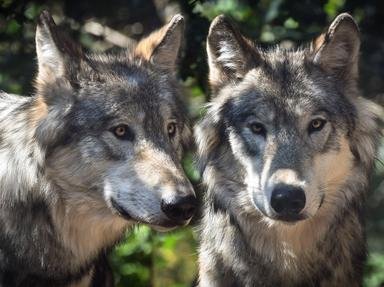Quiz Answer Key and Fun Facts
1. One afternoon, my neighbor looked at my wolf pup and asked, "What species is he?" When I told him the scientific name was Canis lupus, he shrugged and said he didn't know much about wolves. Which of the following is correctly identified as Canis lupus?
2. My neighbor once asked me how much a healthy grown wolf eats, and confidently said, "I bet it's definitely less food than what my German Shepherd can eat, since wolves don't require much to stay healthy and reproduce." Is that true or false?
3. While walking with his German Shepherd outside, my neighbor told me, "I heard wolves can walk incredibly long distances in the forest while searching for food, like thirty or even forty miles (around fifty to sixty km)". Is what he said true or false?
4. After a quick jog, my neighbor laughed and said, "At full speed, my German Shepherd could make your wolf look like it's standing still." "But can he really?", I thought. Who actually has the higher top speed?
5. Later that night, while cleaning his German Shepherd's teeth, my neighbor chuckled and said, "At least my dog has much more teeth than your wolf ever will." Is that true or false?
6. Next morning we met on our usual walk, and my neighbor proudly said, "German Shepherds are the best sniffers in the animal world, and your wolf probably can't smell anything from much farther than my dog can." Is what he said true or false?
7. Later that day, my neighbor said he was traveling out of town and joked, "Well, at least I'm not going somewhere I might run into one of your wolves," so which of the following places is actually a place where you won't find wolves living in the wild?
8. A week later, my neighbor came back from his trip and was celebrating his German Shepherd's sixth birthday. While he was cutting the cake, he asked, "Do you think your wolf will live as long as my dog?" I replied that in the wild, it probably wouldn't, but with me caring, it will. Am I correct?
9. That night, my wolf lifted his head and released a long, echoing howl into the dark. My neighbor called me and asked why it was howling. I don't know the answer, but it made me wonder, wolves howl for many reasons, but which of the following is NOT one of them?
10. One afternoon, my neighbor was showing off how strong his German Shepherd's jaws were as it crunched through a hard toy, and he smirked, "I bet your wolf isn't much stronger than this." I laughed and said that jaw is strong, but when it comes to real bite power, wolves are far stronger. Am I correct?
Source: Author
Hesting_horts
This quiz was reviewed by FunTrivia editor
rossian before going online.
Any errors found in FunTrivia content are routinely corrected through our feedback system.
